|
|
|
Sort Order |
|
|
|
Items / Page
|
|
|
|
|
|
|
| Srl | Item |
| 1 |
ID:
112517
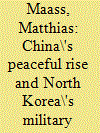

|
|
|
|
|
| Publication |
2011.
|
| Summary/Abstract |
It appears that the latest crisis on the Korean Peninsula, triggered on November 23, 2010, by North Korea, has led the Chinese leadership to revisit its relationship with the Democratic People's Republic of Korea (DPRK) with a renewed sense of urgency. In this paper, I argue that in light of China's wider regional ambitions in particular; such a reexamination is becoming more and more necessary. It has been correctly asserted that the most important source of conflict between China and the United States lies in Beijing's ambition to reclaim China 's historical place as a leading power in the world and the Washington's refusal to surrender the United States' position as the sole superpower: Here, I argue that the likelihood of this conflict erupting in the long term is increased by North Korea's recent aggressive and violent foreign policy bemuse this threatens to further anchor the United States in East Asia, primarily in the context of security affairs.
|
|
|
|
|
|
|
|
|
|
|
|
|
|
|
|
| 2 |
ID:
112516
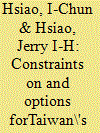

|
|
|
|
|
| Publication |
2011.
|
| Summary/Abstract |
In 2009 Taiwan became an observer to the World Health Assembly (WHA), the first time it had officially participated in a United Nations (UN) -affiliated body since 1971. Encouraged by this success, Taiwan has sought to replicate the WHA model for other UN bodies such as the UN Framework Convention on Climate Change (UNFCCC) and the International Civil Aviation Organization (ICAO). Unfortunately, this breakthrough has not yet paved the way for Taiwan's participation in more Unaffiliated bodies. This paper analyzes (I) the WHA model and the concept of meaningful participation; (2) the four parameters (title, stat as, where. and how) Taiwan needs to consider in order to apply the WHA model to the specialized agencies of the UN; and (3) Taiwan's options for the future. This paper argues that to maximize Taiwan's chances of UN participation. the approach will not only have to take Mainland China's concerns into consideration, but also need" to be within the boundaries of the existing statutes and conventions without the need for a special exception to he made in Taiwan's favor . Hence, it is suggested that Taiwan should seek to join the ICAO, IMF. WSG, WHO, and WMO with official governmental representation while simultaneously encouraging its civil society organizations (CSOs) to participate as non-governmental organization (NGO) observers in the FAO, ILO, IFAD, IMO, ITU, UNESCO, UNIDO, UPU, WIPO, and UNWTO. It is hoped that this two-pronged approach will maximize and accelerate Taiwan's participation in the specialized agencies of the United Nations.
|
|
|
|
|
|
|
|
|
|
|
|
|
|
|
|
| 3 |
ID:
112430


|
|
|
| 4 |
ID:
112429
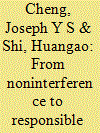

|
|
|
| 5 |
ID:
112427


|
|
|
| 6 |
ID:
112428


|
|
|
| 7 |
ID:
112518


|
|
|
|
|
| Publication |
2011.
|
| Summary/Abstract |
Vietnam and China have had along, if not always amicable, historical relationship. This relationship continued to be important even as Vietnam began its transition from a command economy to greater market orientation using the same strategy of pragmatic gradualism adopted by China when the latter began its own transition a decade before. As this strategy appears now to have lost momentum following the onset of the 2008 global financial crisis, Vietnam's economic planners, preparing the country's Socioeconomic Development Strategy for the new decade (2011-2020), have proposed new initiatives to achieve sustained growth. China's successful experiments, specifically with enterprise groups, special economic zones, and technology and industrial policies, again loom large among these proposed initiatives. To be successful, however, Vietnamese planners will need to be aware of the particular circumstances that favored China's experiments, to draw lessons from China's successes and failures, and to overcome the major challenges that Vietnam especially faces, These include, in comparison with China, a less competitive state enterprise sector; weaker implementation capacity at the subnational level, and pervasive corruption.
|
|
|
|
|
|
|
|
|
|
|
|
|
|
|
|
| 8 |
ID:
112426
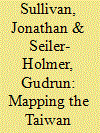

|
|
|
| 9 |
ID:
112515
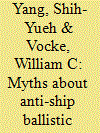

|
|
|
|
|
| Publication |
2011.
|
| Summary/Abstract |
Anti-ship ballistic missiles (ASBMs) are thought by many to be a "game-changer" for the People's Republic of China (PRC) in future military conflicts with the United States around Taiwan, but critics refute this "game-changer" notion. The arguments on both sides are myths. Missile defense cannot be one hundred percent effective in intercepting incoming ASBMs, and an aircraft carrier is bound to be spotted if it is going to be a useful war-fighting machine. Nonetheless, ASBMs do not change the game in the PRC's favor. Carriers are not crucial to a U.S. intervention. Other assets immune to ASBMs can Stop a military takeover of Taiwan. Sinking U.S. carriers would also be counterproductive for the PRC, as it would escalate a conflict which Beijing has little chance of winning.
|
|
|
|
|
|
|
|
|
|
|
|
|
|
|
|
| 10 |
ID:
112514
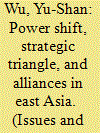

|
|
|
|
|
| Publication |
2011.
|
| Summary/Abstract |
This paper complements the traditional realist perspective (TP) with the strategic triangle theory (ST) in analyzing alliance formation and shift in East Asia. Alliance is perceived as a marriage triangle, and is subject to the dynamics of strategic actions taken by players to elevate their roles in the game. During the Cold War; two hierarchically structured alliance systems opposed each other in East Asia. Power shift in the continental system disrupted the Sino-Soviet pact, while hegemonic stability; in the maritime system buttressed the U.S.-led alliance. The division in the con-tinental system offered Washington opportunities to befriend Beijing and buttress its position in the U.S-Soviet-PRC strategic triangle. Washing-ton's allies were prompted to act likewise. The tension in competitive rapprochement was absorbed by the hegemonic structure of the maritime system. The, result was collective hedging (balancing-cum-engagement). In the post-Cold War era, the predominance of the United States caused the revival of the Beijing-Moscow nexus, now constructed as an equal partnership. Again one finds the continental and the maritime systems facing each other. Cross-system hedging is inevitable as this would increase the payoff of strategic players. Russia and Taiwan are examined in the above context, combining the perspectives of both TP and ST. The rise of China is expected to cause tension in the continental system. As predicted by the internal security dilemma. The rise of China also impacts on the maritime system by both increasing the tendency to balance it (as predicted by TP), and to improve relations with it (as predic1ed by ST), hence prompting hedging. However hedging is difficult for Taiwan, for it is only loosely connected to the maritime alliance..
|
|
|
|
|
|
|
|
|
|
|
|
|
|
|
|
| 11 |
ID:
112431
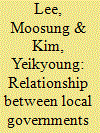

|
|
|
|
|
|
|
|